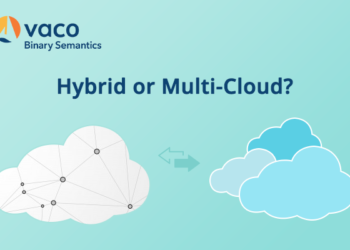Cloud computing is increasingly becoming popular in all sorts of companies either enterprises or NPOs, either SMBs established business or new startup companies. Everyone understands how important it is and making a digital transformation strategy on the basis of these two have turned out as the most influential decisions of the businesses ever.
But which cloud option one must opt for a business? Should they go for multi-cloud or hybrid-cloud would prove the best? People find it much confusing while picking one out of these two!
Well, preferring one option is highly depends on your requirements. Let’s discuss what should you choose as per your business needs:
For novices, here’s the brief intro about Hybrid-cloud and Multi-cloud options:
Hybrid-cloud
In this cloud environment, more than one deployment ways are chosen. In simple words, it subsumes both, private as well as public clouds, delivered by the same provider in the same ecosystem.
Multi-cloud
Multi-cloud means that scenario of business in which multi-cloud solutions are taken from different vendors under the same deployment model. It means using public cloud services from several vendors.
How to Make a Right Choice in Multi-Cloud and Hybrid-Cloud Options?
It goes without saying that both the options have their own privileges and importance. Enterprises usually find themselves in perplex while resorting to one among these two. So, here for your ease, we are putting you forward towards certain factors that you should consider while making a choice between the two.
Go through these:
- Flexible Approach
The amount of flexibility varies from organization to organization. By resorting to the Multi-cloud option, the scope of flexibility hikes up comparing hybrid option.
Each service provider will offer you enhanced cloud services to meet your specific workloads and requirements, under multi-cloud computing. So, you can bring innovations to your works by having more scope.
However, Hybrid-cloud is the approach of one-size-fits-all. All requirements of the entire business might not be implemented under this. Its scope is limited to specific criteria.
- Security and Privacy
Unsecured clouding has become a major reason that organizations have halted its use. So, before finally picking the one, it’s necessary to go through the privacy options.
For security reasons, hybrid cloud computing is better than multi-cloud where the security is always a complicated issue. But this doesn’t mean, hybrid computing gives you a clean chit.
To mitigate potential security menaces, it’s necessary to look after vulnerabilities, leakages and analyze all the options for data storage for better security and privacy of data.
- Vendor Lock-in
Vendor lock-in might become a major risk for any organization and if you feel your enterprise will also be its risk, then it’s better to go with the multi-cloud option. It doesn’t mean that a hybrid cloud option will not serve this purpose, but the quickness of multi-cloud computing in migrating away from the provider that is the reason for the troubles you are confronted with.
- Intricate
In terms of complexity and complicated processing, the multi-cloud option might not be the right one. However, if you want to adopt multi-clouding, then surely your IT team must have adeptness to tackle the nuances created by cloud providers and should possess the capability to adopt it in the best possible way.
As in the hybrid-cloud, the public providers are less so managing them is not a much difficult task.
Takeaway
It’s difficult to say which one you should opt for, as both have their own pros & cons. The decision would considerably be dependent upon your organization and its varied needs. Still, Binary Semantics is here to guide you in this regard and offer you the best clouding services contrasting to any other provider.



